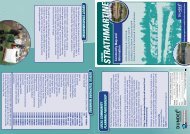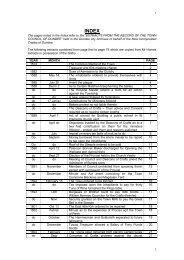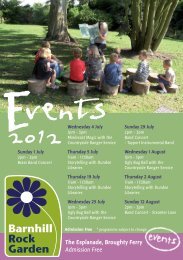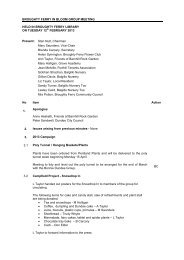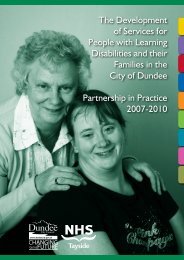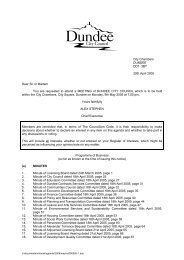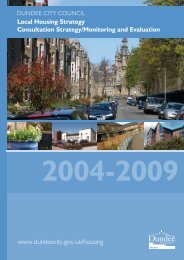Information for Parents and Carers of Children with - Dundee City ...
Information for Parents and Carers of Children with - Dundee City ...
Information for Parents and Carers of Children with - Dundee City ...
You also want an ePaper? Increase the reach of your titles
YUMPU automatically turns print PDFs into web optimized ePapers that Google loves.
BROTHERS & SISTERS<br />
Most <strong>of</strong> us grow up <strong>with</strong> one or more brother <strong>and</strong> sister. How we get on <strong>with</strong> them can<br />
influence the way we develop <strong>and</strong> what sort <strong>of</strong> people we become.<br />
As young children we may spend more time <strong>with</strong> our brothers <strong>and</strong> sisters than <strong>with</strong> our<br />
parents. Relationships <strong>with</strong> our siblings are likely to be the longest we have <strong>and</strong> can be<br />
important throughout our adult lives too.<br />
Studies about siblings <strong>of</strong> people <strong>with</strong> additional needs have tended to report a mixed<br />
experience, an <strong>of</strong>ten-close relationship <strong>with</strong> some difficulties. Most siblings cope very well<br />
<strong>with</strong> their childhood experiences <strong>and</strong> sometimes feel strengthened by them. They seem to<br />
do best when parents, <strong>and</strong> other adults in their lives, can accept their brother or sister’s<br />
additional needs <strong>and</strong> clearly value them as an individual.<br />
Avoiding family secrets, as well as giving siblings the chance to talk things over <strong>and</strong> express<br />
feelings <strong>and</strong> opinions, can go a long way to help them deal <strong>with</strong> worries <strong>and</strong> difficulties that<br />
are bound to arise from time to time.<br />
Get pr<strong>of</strong>essional advice about caring tasks <strong>and</strong> h<strong>and</strong>ling difficult behaviour in which siblings<br />
can be included.<br />
Try to keep the family’s sense <strong>of</strong> humour!<br />
• Restriction on family activities<br />
Try to find normal family activities that everyone can enjoy eg swimming, picnics.<br />
See if there are holiday schemes in which the sibling or child can take part.<br />
Use help from family or friends <strong>with</strong> the child or siblings.<br />
• Guilt about being angry <strong>with</strong> a brother or sister <strong>with</strong> Additional Needs<br />
Make it clear that it is all right to be angry sometimes; strong feelings are part <strong>of</strong> any close<br />
relationship.<br />
Share some <strong>of</strong> your own mixed feelings at times.<br />
Siblings may want to talk to someone outside the family. Find out if there is a support group<br />
<strong>for</strong> siblings in your area. (Young <strong>Carers</strong> Partnership)<br />
• Embarrassment about a brother or sister in public<br />
Realise that relatives can be embarrassing, especially parents!<br />
Find social situations where the child <strong>with</strong> additional needs is accepted.<br />
If old enough, split up <strong>for</strong> a while when out together.<br />
<strong>In<strong>for</strong>mation</strong> Pack – <strong>Children</strong>’s Services 12




